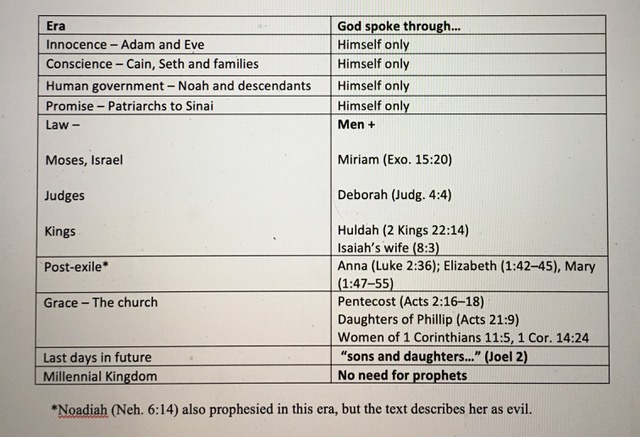
Women Speaking for God in Mixed Groups?
Recently, when I went to look up the female prophets in the Bible, I reached for one of my reference books that claimed to list the OT mouthpieces for God. But it included only the male prophets. Yes, missing from that guide were all the females who should have been there, such as Miriam, Huldah, and Deborah.
In every era of redemption history in which men have prophesied, God has raised up at least one woman, and sometimes multiple women, to speak for him as his prophet. And since the book I consulted didn’t have the info I needed, I had to create the list for myself. Perhaps you will find it helpful:
What’s a prophet?
So what exactly are prophets? Men and women who serve as God’s spokespersons. Indeed, the Hebrew word Nəḇî’îm, translated into English as prophets, means “spokespersons.” So prophets are people who speak God’s words to groups or individuals. And what is their content? We might think it’s predicting the future, but most of the time it’s actually broader than that—prophecy is any direct revelation from God.
And the revelation, while received from God, is not communicated by Him through mere channeling. Channeling is (it is supposed) entering into a trancelike state in order to dictate messages from another source. The person’s own brain checks out. But when God has a message, God uses the person and his or her brain to convey the truth. Think about how we got the Scriptures….
The fact that God did not use channeling, but rather incorporated the personalities and circumstances of the prophets, is the reason we can find in the Scriptures statements such as Paul asking of Timothy, “When you come, bring the cloak that I left with Carpus at Troas, and my scrolls, especially the parchments” (2 Tim 4:13). Their circumstances actually help us understand God’s intent. For example, when standing on Mars Hill, Paul noticed a bunch of altars to false gods, with one dedicated to an unknown deity. Paul affirmed the Athenians for their religiosity, but he went on to reveal the identity of the God they did not know. Most of us don’t live in cities with altars dedicated to false gods, but we can learn from Paul’s situation the importance of finding common ground for speaking the truth. So the point? Prophesying is not channeling.
The Text
In his letter to the church in Corinth known to us as 1 Corinthians, Paul corrected some issues relating to the church’s practice during corporate worship. He assumed that in the gathered assembly there would be more than one person present as God’s spokesperson. The men who prayed and prophesied while “having down from the head,” (possibly a reference to a certain kind of hairstyle) were acting shamefully. And the women (or perhaps wives), were acting disgracefully by having their heads uncovered (1 Cor. 11:5), because hair was given as a covering (v. 15). Now, please don’t get bogged down here trying to figure out the meaning of certain hair practices in Corinth. We’re talking about prophesy here. Stay with me. And notice something: Paul assumes women will prophesy. There is no question here about whether women will speak the truth from God in the presence of men, who will learn something (or ought to—since the words are given by God). He tells men and women what to do with their heads as they prophesy, because they are both going to prophesy.
The Corinthians are in love with sign gifts, especially speaking in tongues. So in chapter 12, Paul is giving them a primer on spiritual gifts. But in the middle of his argument, he hits “pause,” and spends all of chapter 13 waxing eloquent about how spiritual gifts are useless without love. Of prophesy he specifically says, “If I have prophesy…but do not have love, I am nothing” (v. 2).
Then Paul returns to his point about gifts. And he exhorts the church, “Pursue love, and earnestly desire the spiritual gifts, especially that you may prophesy” (14:1). In doing so, he elevates prophesy above tongues, because “the one who prophesies speaks to people for their upbuilding and encouragement and consolation…The one who prophesies is greater than the one who speaks in tongues, unless someone interprets, so that the church may be built up” (vv. 4–5) and “since you are eager for manifestations of the Spirit, strive to excel in building up the church” (v. 12). He assumes the human mind is engaged, when one prophesies, stating: “in church I would rather speak five words with my mind in order to instruct others, than ten thousand words in a tongue” (v. 19). And he wants them all to be ambitious for speaking the Word, based on the assumption that doing so builds up the church and is not motivated out of selfish ambition.
Paul describes how such gifts look in a gathered context: “When you come together, each one has a hymn, a lesson, a revelation, a tongue, or an interpretation. Let all things be done for building up” (vv. 26–27). He even ranks the gifts: “God has placed in the church first of all apostles, second prophets, third teachers…” (v. 28). So prophecy, in terms of equipping the church, is even more exalted than teaching.
And there is not just one “pastor” delivering a homily behind a pulpit; instead, he exhorts, “Let two or three prophets speak, and let the others weigh what is said” (v. 29). Another evidence that humans can control their minds as they speak for God appears in vv. 30–31, where Paul writes, “If a revelation is made to another sitting there, let the first be silent. For you can all prophesy one by one, so that all may learn and all be encouraged.” They can control their delivery. In fact, those prophesying can and should even submit themselves to the evaluation of others: “and the spirits of prophets are subject to prophets. For God is not a God of confusion but of peace (vv. 32–33). His emphasis in this last part is order, order, order.
So in chapter 11, he told women how to appropriately prophesy. And here he gives some instruction about the purpose and practice of prophesying, a few short chapters later. Then he ends by talking about how some prophets must submit to others when prophesying, followed by this:
“…the women [or wives] should keep silent in the churches. For they are not permitted to speak, but should be in submission, as the law also says. If there is anything they desire to learn, let them ask [vet, grill—not the usual word for “ask” here] their husbands at home. For it is shameful for a woman [or wife] to speak in church (vv. 35).
What the actual heck?
Then, four verses later, he reiterates what he’d said earlier about how prophesy is better than tongues, and he emphasizes again that all things should have order, order, order: “Earnestly desire to prophesy, and do not forbid speaking in tongues. But all things should be done decently and in order” (vv. 39–40).
Options for Interpretation
Some think Paul means women should never prophesy or speak at all in church. But such an interpretation flat-out contradicts his assumption that women will prophesy in church given three chapters earlier. All should want everyone to be edified.
Some think Paul means women (or wives) should not prophesy until they have a chance to learn more (hence, ask at home/learn).
Some (a few of my teachers in the 1980s) have said prophesying done by women must be more like channeling—in which God bypasses a female’s mind, so she does not pollute God’s word. These teachers have sought to reconcile the practice of women prophesying with Paul not allowing women to teach elsewhere (1 Tim 2) by saying women can prophesy because God overrules their brains, but women can’t teach because that would involve thinking/interpreting.
Some (e.g, Payne), even some on the front lines defending inerrancy (e.g., Fee), think Paul’s prohibition here was added to an early text by a scribe and is not original. The words do appear at different places in some early texts, suggesting they might have been written in the margin as a comment and later incorporated into the actual text.
Some (e.g., Winstons) think Paul’s reference to husbands (the ones at home) suggests the apostle has only wives in view, not all women. The word for woman/wife (gunh) is one and the same in Greek, and only context tells which word he means. Since this context has “husbands,” the logical counterpart is not all “women” but “wives.” Also, the word “submission” is here—a word Paul connects elsewhere to wives in marriage (Eph. 5:22). So while women (superset) do prophesy, the wives (subset) should refrain from questioning their husbands publicly.
Many (e.g., Winter) think Paul was not referring to all spiritual gifts that involve speaking, but that his closing reference was limited to the public vetting of others’ prophecies. The statement about women falls in the final section about order. And the word he uses for “ask” is not usually used to refer to typical question-asking, but is more connected with vetting and grilling.
Additionally, the “law” Paul has in mind might have been the civil law, not the Jewish Torah (the OT does not actually outright say women/wives are to submit); perhaps he was concerned with the church’s gospel witness if women went against local rules and grilled men’s prophecies in public.
What It All Means
Whatever Paul means, I want us to notice something important: there cannot be some creation-order-based, all-time principle that says God will speak God’s Word to men only through other men or that a godly man cannot learn God’s truth from a woman.
Nor is there some biblical teaching that says a woman should not even speak the truth of God in the presence of males (though she can teach Spanish or geology or chemistry—especially if she does so at home). The very presence of women prophets throughout history + Pentecost as a sign of the Spirit (i.e., good) being men and women and children speaking God’s Word + the NT assumption of female prophets in the early church + the promise that in the eschaton women will again prophesy when filled with the Spirit—these realities, especially when taken together, flatly contradict such an idea.
Even if one believes the gift of prophecy ended in the first century, he or she must still reckon with the consistent Spirit-work of speaking God’s truth through women to men and women throughout redemption history.
Do you see the harm in such woman-silencing interpretations? In teaching that the one thing most needed must not be spoken on the lips of a women when men are present (see John 4)? Or that women must not in mixed company exhort God’s people about key doctrines—like the nativity, the cross, and the resurrection? And that if they do, men must not listen? Indeed, a man should listen when God speaks through a donkey (Num 22:21ff), but never expect the Lord to use a woman?
We must not be more conservative than God.
As my friend Sharifa pointed out this week, Jesus did not say, “Woman, go home and be silent.” Jesus said, “Go quickly! And tell his [12 men]: ‘He has risen from the dead’!”



